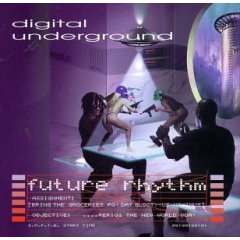| Future Rhythm | ||||
|---|---|---|---|---|
 | ||||
| Studio album by | ||||
| Released | June 4, 1996 | |||
| Recorded | 1995–1996 | |||
| Genre | West Coast hip hop | |||
| Length | 54:49 | |||
| Label |
| |||
| Producer | D-Flow Production Squad | |||
| Digital Underground chronology | ||||
| ||||
| Singles from Future Rhythm | ||||
| ||||
Future Rhythm is the fourth studio album by the American hip hop group Digital Underground. It was released on June 4, 1996, via Critique/Radikal Records. [1] [2] [3] The album was produced by the D-Flow Production Squad. It features guest appearances from Black Spooks, Luniz and the Del the Funky Homosapien. The album reached number 113 on the Billboard 200 and number 26 on the Top R&B/Hip-Hop Albums in the United States. [4]
Contents
The album was supported with two singles: "Oregano Flow" and "Walk Real Kool", which peaked at numbers 75 and 95, respectively, on the US Billboard Hot R&B/Hip-Hop Songs chart. Songs "Food Fight" and "We Got More" were featured in Paris Barclay's film Don't Be a Menace to South Central While Drinking Your Juice in the Hood , with the latter ended up appearing in its soundtrack album.